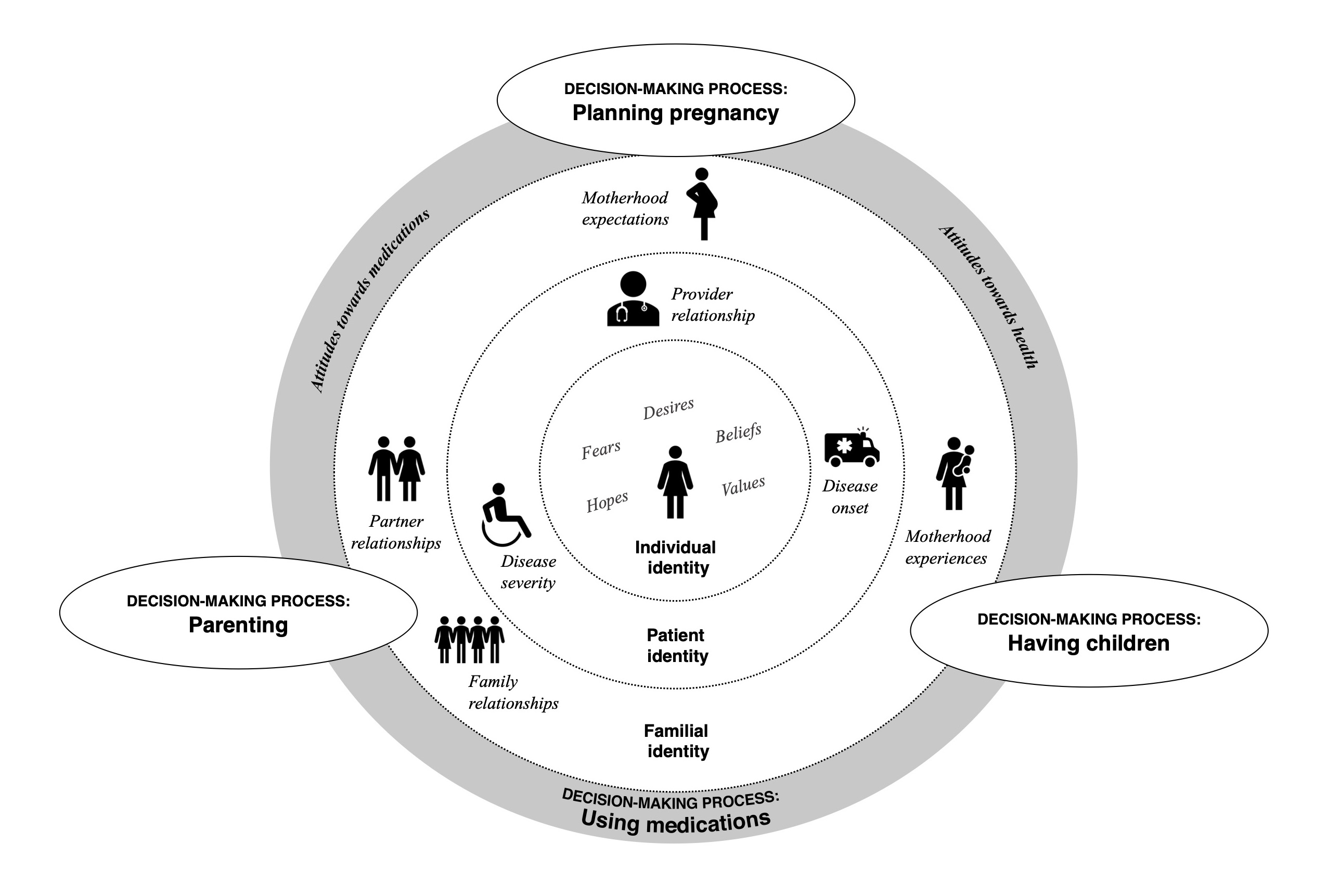Session Information
Session Type: Poster Session D
Session Time: 9:00AM-11:00AM
Background/Purpose: Despite guidelines for managing rheumatoid arthritis (RA) in pregnancy, high rates of discontinuation of disease-modifying anti-rheumatic drugs (DMARDs) considered safe for women with RA during pregnancy may suggest a translation gap of emerging clinical knowledge to patients. We examined the process of making treatment and pregnancy decisions among women with RA.
Methods: Study design. We conducted a mixed-methods qualitative research study. Participants. Through collaborations with rheumatologists and patient partners, we used poster and social media advertisements to recruit a purposive sample of female participants who were 18 years or older, had an RA diagnosis confirmed by a rheumatologist, lived in Canada, and were able to communicate in English or French. Data collection. We collected data through semi-structured focus group and individual interviews using telephone and video conferencing technology. Focus groups were composed of participants with similar pregnancy and medication use experiences. Data analysis. We analysed data using a Constructivist Grounded Theory approach within a feminist theoretical framework, which involved steps of line-by-line coding, focused coding and categorizing, and theoretical coding. Data collection and analysis were iterative and continued until saturation of themes was achieved.
Results: We recruited 22 participants across Canada who had a mean age of 34 years, median 7 years since RA diagnosis, and most (86%) were married or co-habited with a partner. Overall, 36% had never been pregnant, 55% had previously been pregnant, and 9% were pregnant at the time of interview. Of those who had experienced pregnancy, 58% had at least one pregnancy while diagnosed with RA and of those, a further 67% used DMARD(s) during a pregnancy. Over half (55%) reported intending to have future children through childbearing or other means. We constructed a framework (see Figure 1) depicting the dynamic relationships between 4 identified decision-making processes: 1) using medications, 2) having children, 3) planning pregnancy, and 4) parenting. Moreover, we elicited the complex influence of contextual factors on these processes, particularly attitudes towards health and medications, disease onset and severity, familial support system, and healthcare provider relationship.
Conclusion: Our framework provides insight into how women have made reproductive health decisions in the context of managing RA. By understanding the practical and emotional aspects of this process, healthcare providers can identify opportunities for intervention or care adaptation leading to improved health outcomes for women and babies. Our findings demonstrate that a patient-centred approach to care supports women with RA in making better reproductive choices that align with their individual values.
 Figure 1. A constructivist, woman-centred, grounded theory framework for making pregnancy and family decisions in relation to living with rheumatoid arthritis. INDIVIDUAL IDENTITY: encompasses a woman’s personal hopes, desires, beliefs, values, and fears about her life. PATIENT IDENTITY: encompasses a woman’s experiences of being a patient, including the timing of disease onset, disease experience and severity, and relationships with healthcare providers. FAMILIAL IDENTITY: encompasses a woman’s experience of being a member of a family, including expectations of motherhood, motherhood experiences, and relationships with family and/or romantic partner(s). Dotted lines: demonstrate that a woman’s identities are fluid, overlapping, and influence one another. Gray shading: demonstrates that medication decisions occur in a dynamic context between a woman’s identities and other decision-making processes.
Figure 1. A constructivist, woman-centred, grounded theory framework for making pregnancy and family decisions in relation to living with rheumatoid arthritis. INDIVIDUAL IDENTITY: encompasses a woman’s personal hopes, desires, beliefs, values, and fears about her life. PATIENT IDENTITY: encompasses a woman’s experiences of being a patient, including the timing of disease onset, disease experience and severity, and relationships with healthcare providers. FAMILIAL IDENTITY: encompasses a woman’s experience of being a member of a family, including expectations of motherhood, motherhood experiences, and relationships with family and/or romantic partner(s). Dotted lines: demonstrate that a woman’s identities are fluid, overlapping, and influence one another. Gray shading: demonstrates that medication decisions occur in a dynamic context between a woman’s identities and other decision-making processes.
To cite this abstract in AMA style:
Rebic N, Garg R, Munro S, Hazlewood G, Amiri N, Bansback N, Ensworth S, Baldwin C, Proulx L, De Vera M. Making Decisions About Medication Use, Pregnancy, and Having Children Among Women with Rheumatoid Arthritis: A Constructivist Grounded Theory Study [abstract]. Arthritis Rheumatol. 2020; 72 (suppl 10). https://acrabstracts.org/abstract/making-decisions-about-medication-use-pregnancy-and-having-children-among-women-with-rheumatoid-arthritis-a-constructivist-grounded-theory-study/. Accessed .« Back to ACR Convergence 2020
ACR Meeting Abstracts - https://acrabstracts.org/abstract/making-decisions-about-medication-use-pregnancy-and-having-children-among-women-with-rheumatoid-arthritis-a-constructivist-grounded-theory-study/
